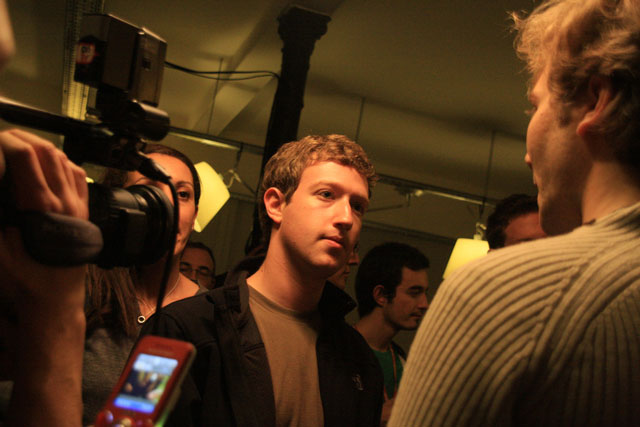
Facebook CEO Mark Zuckerberg laid out his strategy for augmented reality on Tuesday, saying the social network will use smartphone cameras to overlay virtual items on the real world rather than waiting for AR glasses to be technically possible.
People will be able to use their phones to play games virtually on coffee tables, overlay statistics on a video of their daily run, leave a virtual note on the fridge, and more, Zuckerberg said on Tuesday on stage at F8, the company’s developer conference in San Jose, California.
It’s an evolution of the kind of technology that Snapchat pioneered, allowing people to change their faces into fun characters like puppies and vomiting rainbows. Facebook has spent the last few months adding Snapchat-like cameras to all of its apps.
“Even if we were a little slow to add cameras to all our apps, I’m confident we’re going to push this augmented reality platform forward,” Zuckerberg said. “As silly as these effects might seem, they’re actually really important and meaningful because they allow us to share what’s important to us on a daily basis.”
Zuckerberg sees virtual and augmented reality as the next phase of technological communication — and he’s not alone. Virtual reality completely immerses users in an artificial world and is being pushed most actively for gaming. Some analysts view it as a niche rather than a potential mainstream technology. Facebook in 2014 paid US$2bn for Oculus, a company that makes virtual reality headsets, taking an early step into the area. Now the field is crowded with others such as Microsoft, Google and Apple, which have more hardware experience.
Watch the Zuckerberg keynote:
Augmented reality is a less-intrusive technology that places virtual elements into a user’s everyday experience. Apple CEO Tim Cook is said to be focusing on this area. Some rivals are building new AR devices, including glasses that project images in front of a user’s eyes. The global market for augmented reality products is estimated to surge 80% to $165bn by 2024, according to researcher Global Market Insights.
With the camera-filter moves announced on Tuesday, Facebook is diversifying its bet and focusing on an area where it’s already dominant: communications software. Zuckerberg said he’s going to open a platform for developers to make AR camera effects for Facebook’s apps, “so we can just be sitting here and we want to play chess, snap, here’s a chessboard and we can play together,” he said. “Or a digital TV on the wall, instead of a piece of hardware it’s a $1 app.”
Earlier on Tuesday, Snap announced that it will also make it possible to overlay three-dimensional effects on a person’s surroundings. — (c) 2017 Bloomberg LP




